System04116: Applied Counselling Practice and Behavioral Theory
VerifiedAdded on 2022/10/11
|9
|2167
|6
Essay
AI Summary
This essay analyzes the behavioral theory of counselling, emphasizing how it can change behavior and feelings, and its suitability for community services. It explains the theory's grounding in the belief that behavior is learned, discussing classical conditioning and other learning processes. The essay explores the effectiveness of behavioral counselling in treating various conditions, such as anxiety disorders and substance abuse, highlighting its scientific methodology and ethical accountability. The author reflects on the skills required for applying this theory in community service work, including empathy and communication, while also addressing challenges and limitations such as its deterministic nature and focus on environmental factors. The essay concludes by examining the theory's goals of increasing personal choice and providing opportunities for relearning problem behaviors within a community setting.
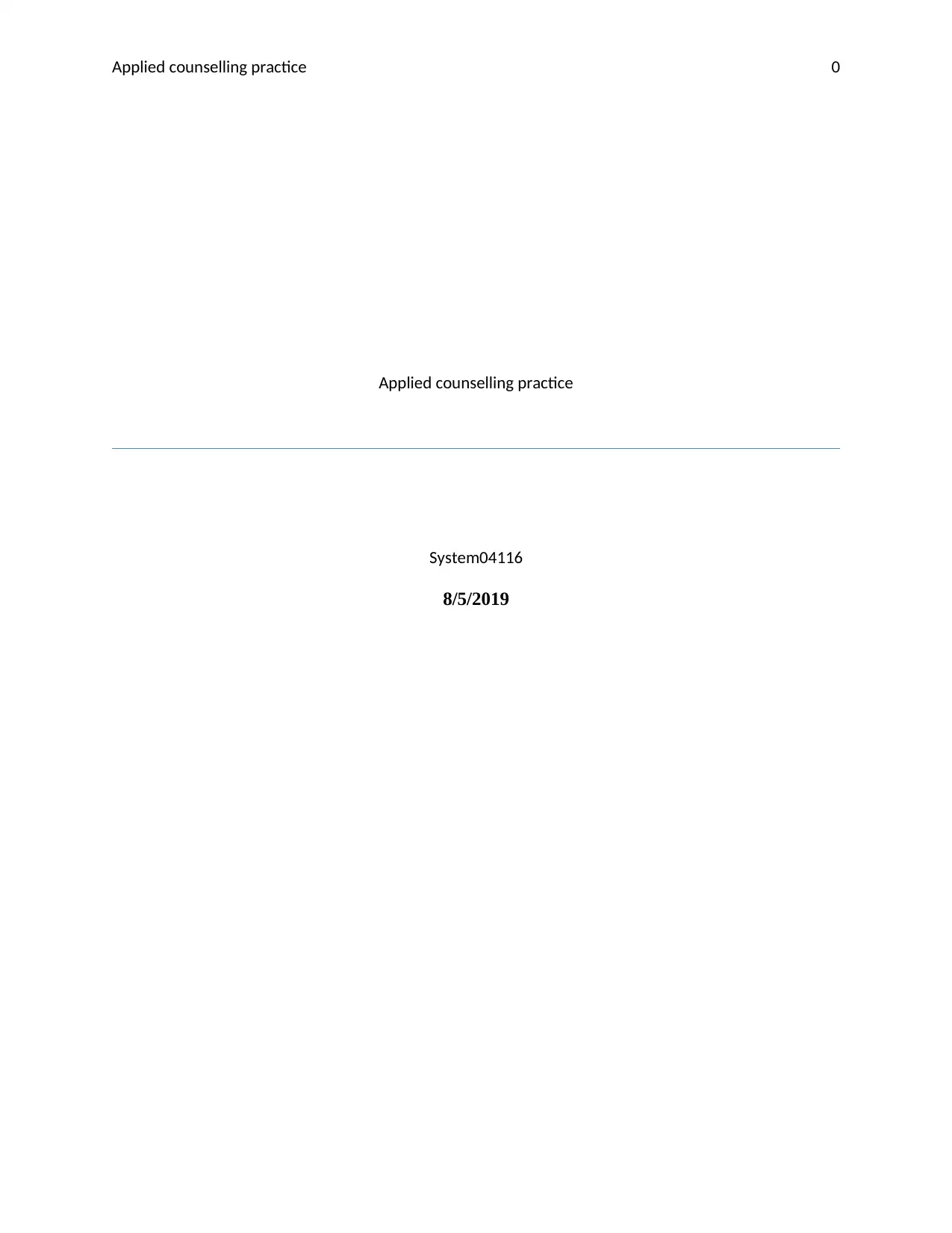
Applied counselling practice 0
Applied counselling practice
System04116
8/5/2019
Applied counselling practice
System04116
8/5/2019
Paraphrase This Document
Need a fresh take? Get an instant paraphrase of this document with our AI Paraphraser
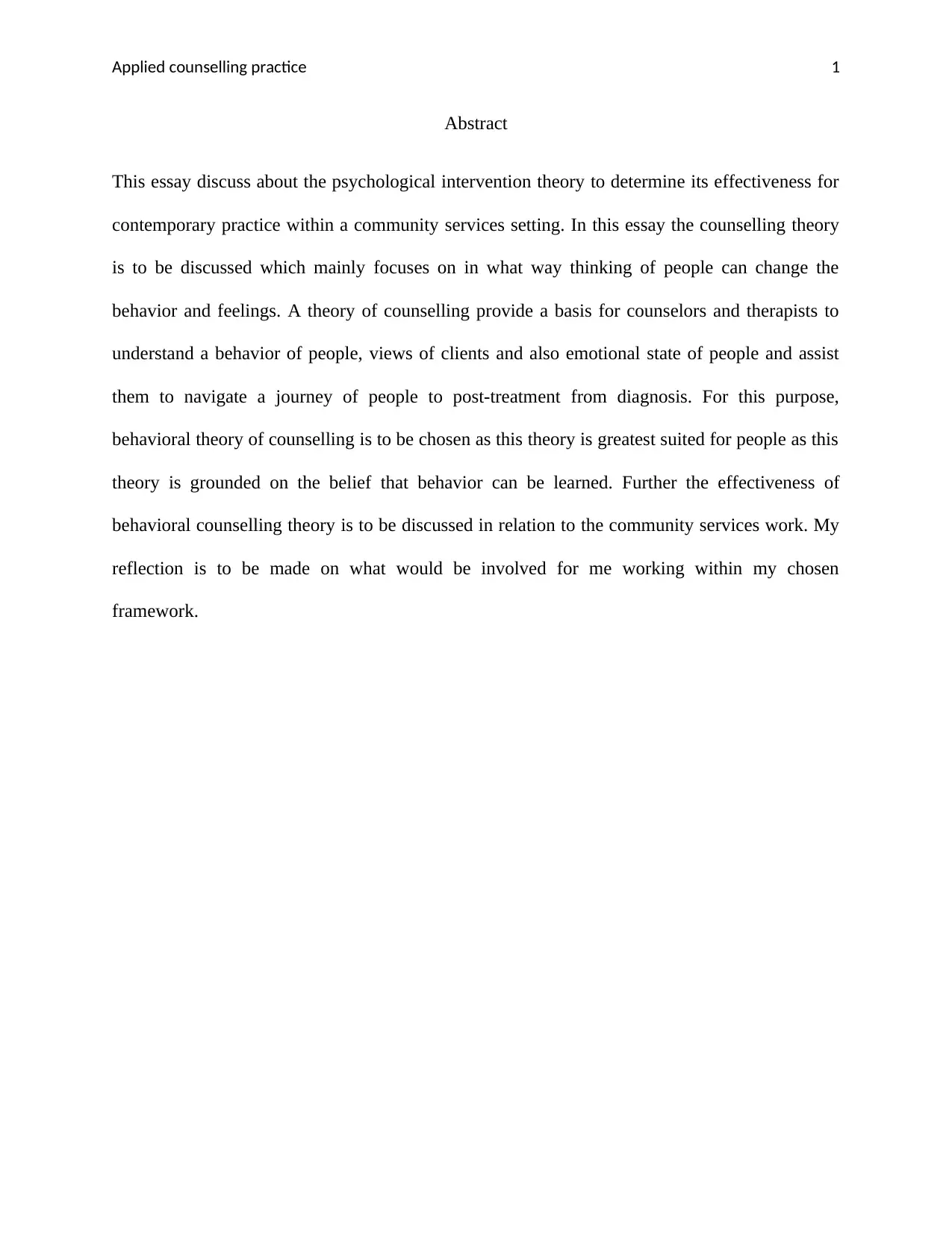
Applied counselling practice 1
Abstract
This essay discuss about the psychological intervention theory to determine its effectiveness for
contemporary practice within a community services setting. In this essay the counselling theory
is to be discussed which mainly focuses on in what way thinking of people can change the
behavior and feelings. A theory of counselling provide a basis for counselors and therapists to
understand a behavior of people, views of clients and also emotional state of people and assist
them to navigate a journey of people to post-treatment from diagnosis. For this purpose,
behavioral theory of counselling is to be chosen as this theory is greatest suited for people as this
theory is grounded on the belief that behavior can be learned. Further the effectiveness of
behavioral counselling theory is to be discussed in relation to the community services work. My
reflection is to be made on what would be involved for me working within my chosen
framework.
Abstract
This essay discuss about the psychological intervention theory to determine its effectiveness for
contemporary practice within a community services setting. In this essay the counselling theory
is to be discussed which mainly focuses on in what way thinking of people can change the
behavior and feelings. A theory of counselling provide a basis for counselors and therapists to
understand a behavior of people, views of clients and also emotional state of people and assist
them to navigate a journey of people to post-treatment from diagnosis. For this purpose,
behavioral theory of counselling is to be chosen as this theory is greatest suited for people as this
theory is grounded on the belief that behavior can be learned. Further the effectiveness of
behavioral counselling theory is to be discussed in relation to the community services work. My
reflection is to be made on what would be involved for me working within my chosen
framework.
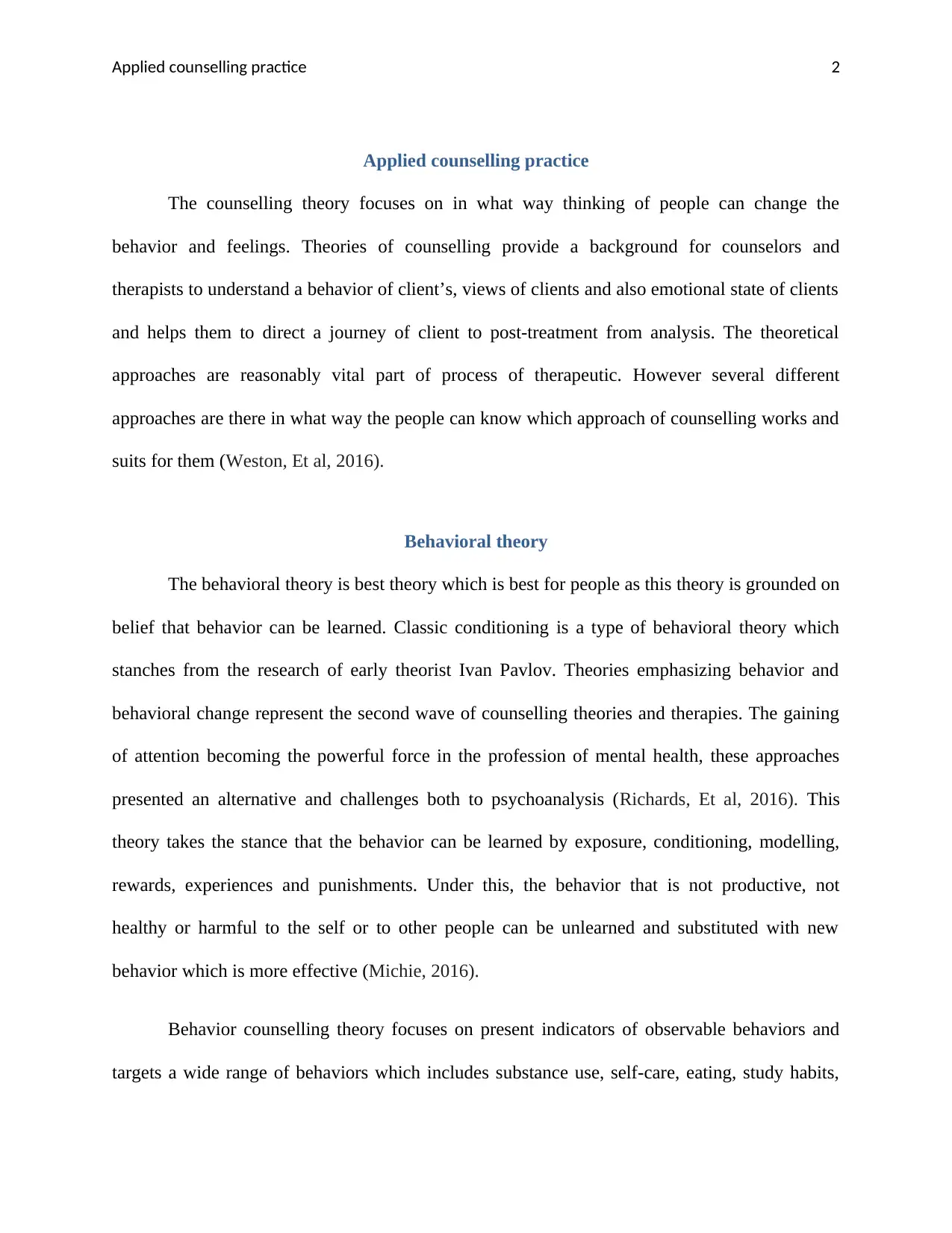
Applied counselling practice 2
Applied counselling practice
The counselling theory focuses on in what way thinking of people can change the
behavior and feelings. Theories of counselling provide a background for counselors and
therapists to understand a behavior of client’s, views of clients and also emotional state of clients
and helps them to direct a journey of client to post-treatment from analysis. The theoretical
approaches are reasonably vital part of process of therapeutic. However several different
approaches are there in what way the people can know which approach of counselling works and
suits for them (Weston, Et al, 2016).
Behavioral theory
The behavioral theory is best theory which is best for people as this theory is grounded on
belief that behavior can be learned. Classic conditioning is a type of behavioral theory which
stanches from the research of early theorist Ivan Pavlov. Theories emphasizing behavior and
behavioral change represent the second wave of counselling theories and therapies. The gaining
of attention becoming the powerful force in the profession of mental health, these approaches
presented an alternative and challenges both to psychoanalysis (Richards, Et al, 2016). This
theory takes the stance that the behavior can be learned by exposure, conditioning, modelling,
rewards, experiences and punishments. Under this, the behavior that is not productive, not
healthy or harmful to the self or to other people can be unlearned and substituted with new
behavior which is more effective (Michie, 2016).
Behavior counselling theory focuses on present indicators of observable behaviors and
targets a wide range of behaviors which includes substance use, self-care, eating, study habits,
Applied counselling practice
The counselling theory focuses on in what way thinking of people can change the
behavior and feelings. Theories of counselling provide a background for counselors and
therapists to understand a behavior of client’s, views of clients and also emotional state of clients
and helps them to direct a journey of client to post-treatment from analysis. The theoretical
approaches are reasonably vital part of process of therapeutic. However several different
approaches are there in what way the people can know which approach of counselling works and
suits for them (Weston, Et al, 2016).
Behavioral theory
The behavioral theory is best theory which is best for people as this theory is grounded on
belief that behavior can be learned. Classic conditioning is a type of behavioral theory which
stanches from the research of early theorist Ivan Pavlov. Theories emphasizing behavior and
behavioral change represent the second wave of counselling theories and therapies. The gaining
of attention becoming the powerful force in the profession of mental health, these approaches
presented an alternative and challenges both to psychoanalysis (Richards, Et al, 2016). This
theory takes the stance that the behavior can be learned by exposure, conditioning, modelling,
rewards, experiences and punishments. Under this, the behavior that is not productive, not
healthy or harmful to the self or to other people can be unlearned and substituted with new
behavior which is more effective (Michie, 2016).
Behavior counselling theory focuses on present indicators of observable behaviors and
targets a wide range of behaviors which includes substance use, self-care, eating, study habits,
⊘ This is a preview!⊘
Do you want full access?
Subscribe today to unlock all pages.

Trusted by 1+ million students worldwide
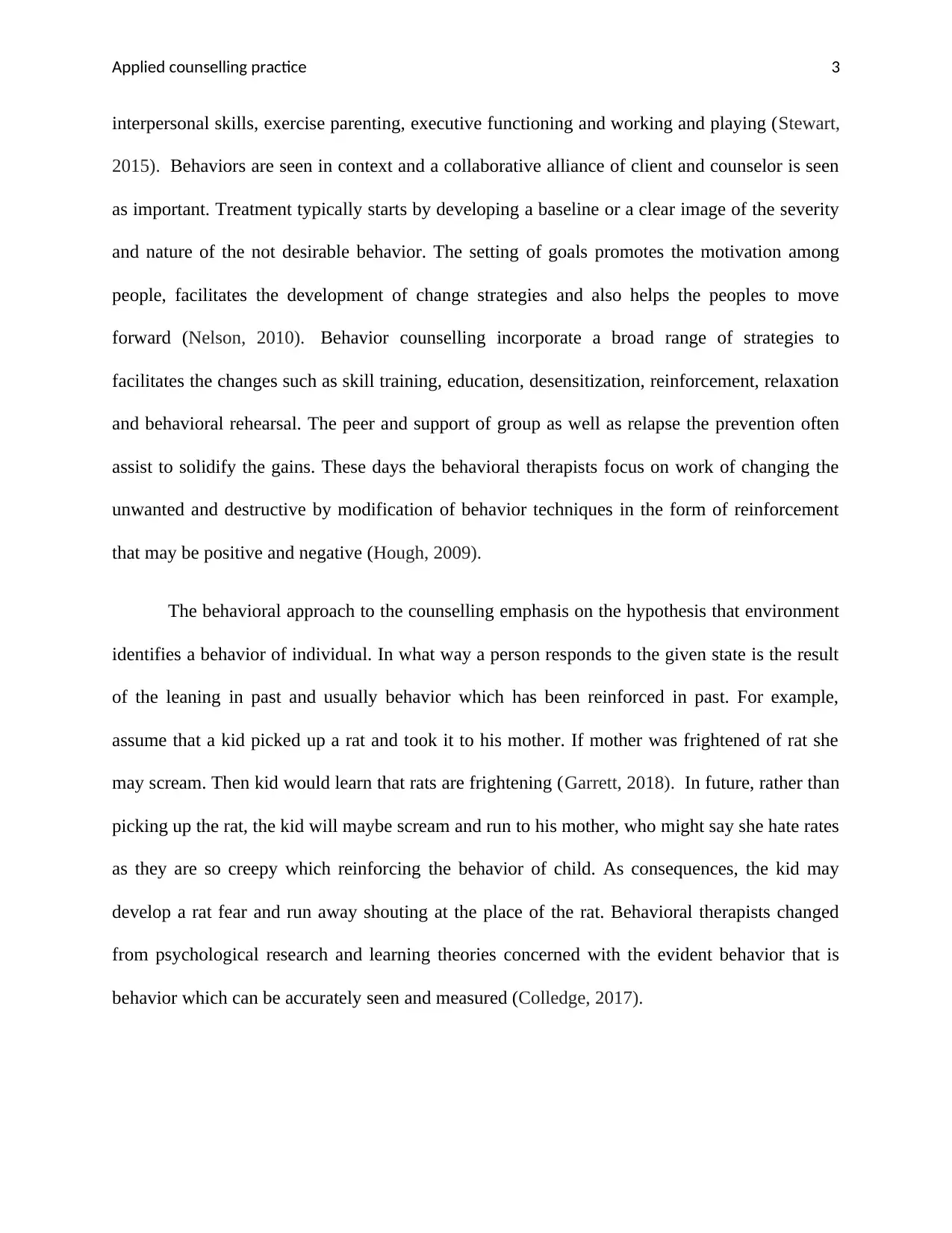
Applied counselling practice 3
interpersonal skills, exercise parenting, executive functioning and working and playing (Stewart,
2015). Behaviors are seen in context and a collaborative alliance of client and counselor is seen
as important. Treatment typically starts by developing a baseline or a clear image of the severity
and nature of the not desirable behavior. The setting of goals promotes the motivation among
people, facilitates the development of change strategies and also helps the peoples to move
forward (Nelson, 2010). Behavior counselling incorporate a broad range of strategies to
facilitates the changes such as skill training, education, desensitization, reinforcement, relaxation
and behavioral rehearsal. The peer and support of group as well as relapse the prevention often
assist to solidify the gains. These days the behavioral therapists focus on work of changing the
unwanted and destructive by modification of behavior techniques in the form of reinforcement
that may be positive and negative (Hough, 2009).
The behavioral approach to the counselling emphasis on the hypothesis that environment
identifies a behavior of individual. In what way a person responds to the given state is the result
of the leaning in past and usually behavior which has been reinforced in past. For example,
assume that a kid picked up a rat and took it to his mother. If mother was frightened of rat she
may scream. Then kid would learn that rats are frightening (Garrett, 2018). In future, rather than
picking up the rat, the kid will maybe scream and run to his mother, who might say she hate rates
as they are so creepy which reinforcing the behavior of child. As consequences, the kid may
develop a rat fear and run away shouting at the place of the rat. Behavioral therapists changed
from psychological research and learning theories concerned with the evident behavior that is
behavior which can be accurately seen and measured (Colledge, 2017).
interpersonal skills, exercise parenting, executive functioning and working and playing (Stewart,
2015). Behaviors are seen in context and a collaborative alliance of client and counselor is seen
as important. Treatment typically starts by developing a baseline or a clear image of the severity
and nature of the not desirable behavior. The setting of goals promotes the motivation among
people, facilitates the development of change strategies and also helps the peoples to move
forward (Nelson, 2010). Behavior counselling incorporate a broad range of strategies to
facilitates the changes such as skill training, education, desensitization, reinforcement, relaxation
and behavioral rehearsal. The peer and support of group as well as relapse the prevention often
assist to solidify the gains. These days the behavioral therapists focus on work of changing the
unwanted and destructive by modification of behavior techniques in the form of reinforcement
that may be positive and negative (Hough, 2009).
The behavioral approach to the counselling emphasis on the hypothesis that environment
identifies a behavior of individual. In what way a person responds to the given state is the result
of the leaning in past and usually behavior which has been reinforced in past. For example,
assume that a kid picked up a rat and took it to his mother. If mother was frightened of rat she
may scream. Then kid would learn that rats are frightening (Garrett, 2018). In future, rather than
picking up the rat, the kid will maybe scream and run to his mother, who might say she hate rates
as they are so creepy which reinforcing the behavior of child. As consequences, the kid may
develop a rat fear and run away shouting at the place of the rat. Behavioral therapists changed
from psychological research and learning theories concerned with the evident behavior that is
behavior which can be accurately seen and measured (Colledge, 2017).
Paraphrase This Document
Need a fresh take? Get an instant paraphrase of this document with our AI Paraphraser
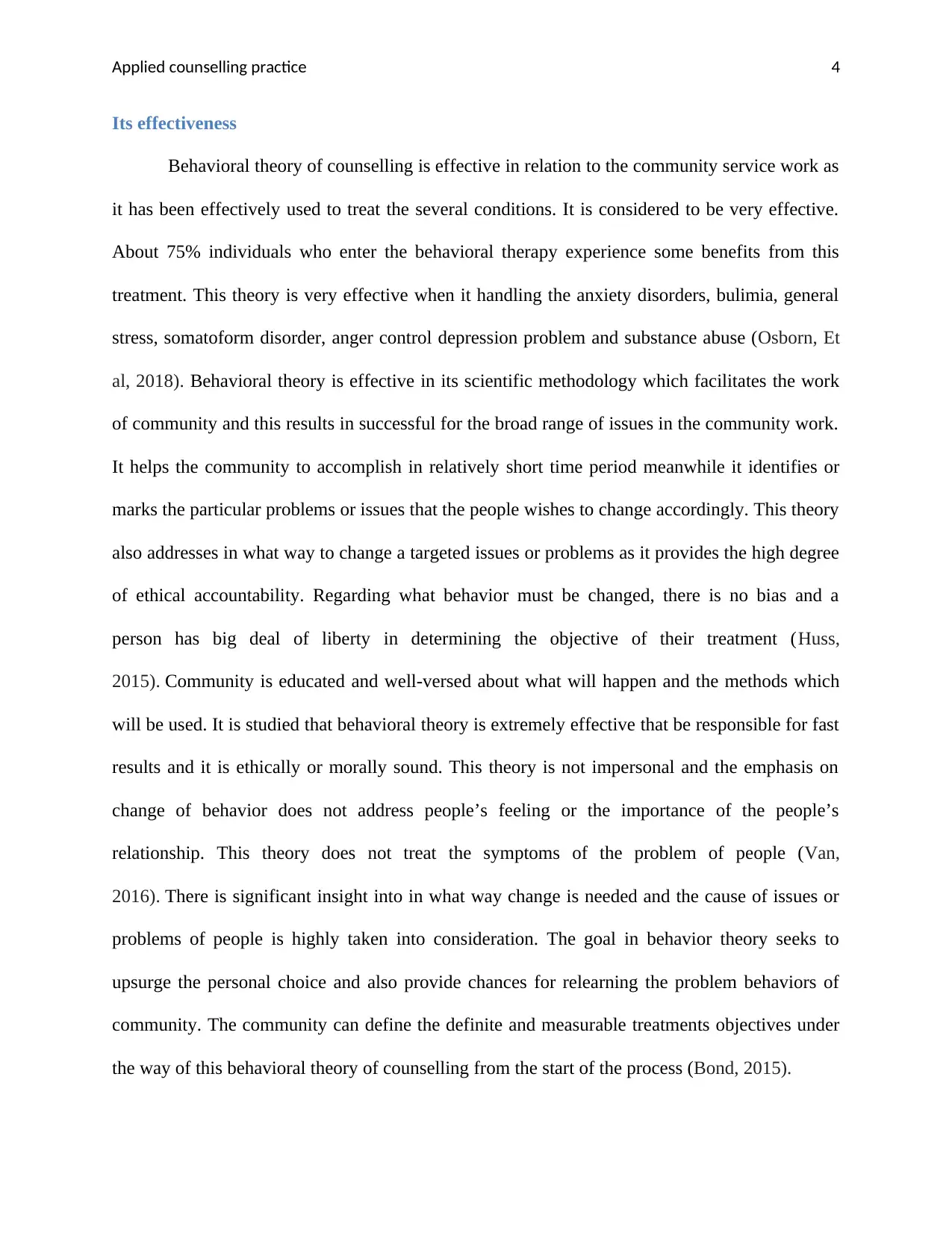
Applied counselling practice 4
Its effectiveness
Behavioral theory of counselling is effective in relation to the community service work as
it has been effectively used to treat the several conditions. It is considered to be very effective.
About 75% individuals who enter the behavioral therapy experience some benefits from this
treatment. This theory is very effective when it handling the anxiety disorders, bulimia, general
stress, somatoform disorder, anger control depression problem and substance abuse (Osborn, Et
al, 2018). Behavioral theory is effective in its scientific methodology which facilitates the work
of community and this results in successful for the broad range of issues in the community work.
It helps the community to accomplish in relatively short time period meanwhile it identifies or
marks the particular problems or issues that the people wishes to change accordingly. This theory
also addresses in what way to change a targeted issues or problems as it provides the high degree
of ethical accountability. Regarding what behavior must be changed, there is no bias and a
person has big deal of liberty in determining the objective of their treatment (Huss,
2015). Community is educated and well-versed about what will happen and the methods which
will be used. It is studied that behavioral theory is extremely effective that be responsible for fast
results and it is ethically or morally sound. This theory is not impersonal and the emphasis on
change of behavior does not address people’s feeling or the importance of the people’s
relationship. This theory does not treat the symptoms of the problem of people (Van,
2016). There is significant insight into in what way change is needed and the cause of issues or
problems of people is highly taken into consideration. The goal in behavior theory seeks to
upsurge the personal choice and also provide chances for relearning the problem behaviors of
community. The community can define the definite and measurable treatments objectives under
the way of this behavioral theory of counselling from the start of the process (Bond, 2015).
Its effectiveness
Behavioral theory of counselling is effective in relation to the community service work as
it has been effectively used to treat the several conditions. It is considered to be very effective.
About 75% individuals who enter the behavioral therapy experience some benefits from this
treatment. This theory is very effective when it handling the anxiety disorders, bulimia, general
stress, somatoform disorder, anger control depression problem and substance abuse (Osborn, Et
al, 2018). Behavioral theory is effective in its scientific methodology which facilitates the work
of community and this results in successful for the broad range of issues in the community work.
It helps the community to accomplish in relatively short time period meanwhile it identifies or
marks the particular problems or issues that the people wishes to change accordingly. This theory
also addresses in what way to change a targeted issues or problems as it provides the high degree
of ethical accountability. Regarding what behavior must be changed, there is no bias and a
person has big deal of liberty in determining the objective of their treatment (Huss,
2015). Community is educated and well-versed about what will happen and the methods which
will be used. It is studied that behavioral theory is extremely effective that be responsible for fast
results and it is ethically or morally sound. This theory is not impersonal and the emphasis on
change of behavior does not address people’s feeling or the importance of the people’s
relationship. This theory does not treat the symptoms of the problem of people (Van,
2016). There is significant insight into in what way change is needed and the cause of issues or
problems of people is highly taken into consideration. The goal in behavior theory seeks to
upsurge the personal choice and also provide chances for relearning the problem behaviors of
community. The community can define the definite and measurable treatments objectives under
the way of this behavioral theory of counselling from the start of the process (Bond, 2015).
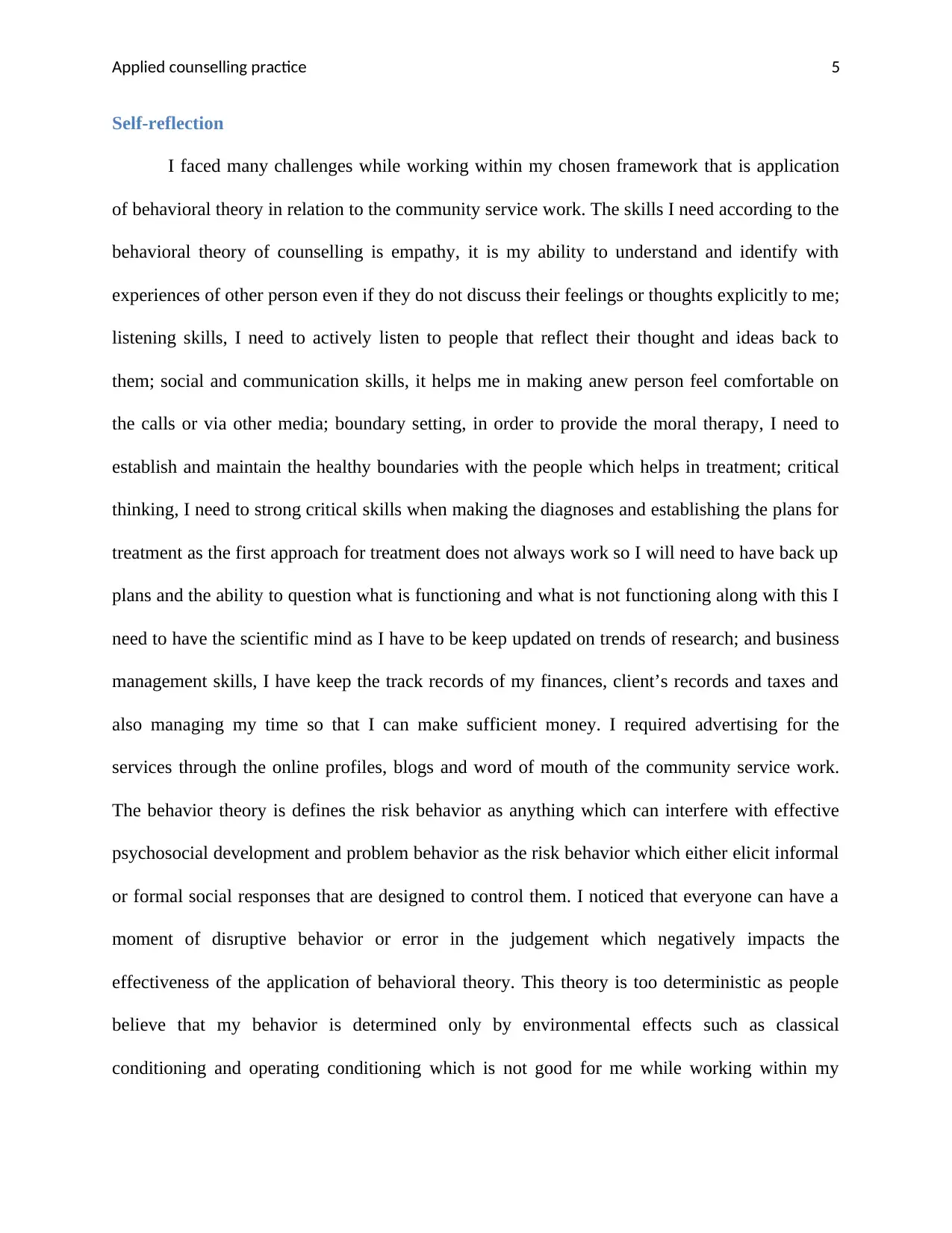
Applied counselling practice 5
Self-reflection
I faced many challenges while working within my chosen framework that is application
of behavioral theory in relation to the community service work. The skills I need according to the
behavioral theory of counselling is empathy, it is my ability to understand and identify with
experiences of other person even if they do not discuss their feelings or thoughts explicitly to me;
listening skills, I need to actively listen to people that reflect their thought and ideas back to
them; social and communication skills, it helps me in making anew person feel comfortable on
the calls or via other media; boundary setting, in order to provide the moral therapy, I need to
establish and maintain the healthy boundaries with the people which helps in treatment; critical
thinking, I need to strong critical skills when making the diagnoses and establishing the plans for
treatment as the first approach for treatment does not always work so I will need to have back up
plans and the ability to question what is functioning and what is not functioning along with this I
need to have the scientific mind as I have to be keep updated on trends of research; and business
management skills, I have keep the track records of my finances, client’s records and taxes and
also managing my time so that I can make sufficient money. I required advertising for the
services through the online profiles, blogs and word of mouth of the community service work.
The behavior theory is defines the risk behavior as anything which can interfere with effective
psychosocial development and problem behavior as the risk behavior which either elicit informal
or formal social responses that are designed to control them. I noticed that everyone can have a
moment of disruptive behavior or error in the judgement which negatively impacts the
effectiveness of the application of behavioral theory. This theory is too deterministic as people
believe that my behavior is determined only by environmental effects such as classical
conditioning and operating conditioning which is not good for me while working within my
Self-reflection
I faced many challenges while working within my chosen framework that is application
of behavioral theory in relation to the community service work. The skills I need according to the
behavioral theory of counselling is empathy, it is my ability to understand and identify with
experiences of other person even if they do not discuss their feelings or thoughts explicitly to me;
listening skills, I need to actively listen to people that reflect their thought and ideas back to
them; social and communication skills, it helps me in making anew person feel comfortable on
the calls or via other media; boundary setting, in order to provide the moral therapy, I need to
establish and maintain the healthy boundaries with the people which helps in treatment; critical
thinking, I need to strong critical skills when making the diagnoses and establishing the plans for
treatment as the first approach for treatment does not always work so I will need to have back up
plans and the ability to question what is functioning and what is not functioning along with this I
need to have the scientific mind as I have to be keep updated on trends of research; and business
management skills, I have keep the track records of my finances, client’s records and taxes and
also managing my time so that I can make sufficient money. I required advertising for the
services through the online profiles, blogs and word of mouth of the community service work.
The behavior theory is defines the risk behavior as anything which can interfere with effective
psychosocial development and problem behavior as the risk behavior which either elicit informal
or formal social responses that are designed to control them. I noticed that everyone can have a
moment of disruptive behavior or error in the judgement which negatively impacts the
effectiveness of the application of behavioral theory. This theory is too deterministic as people
believe that my behavior is determined only by environmental effects such as classical
conditioning and operating conditioning which is not good for me while working within my
⊘ This is a preview!⊘
Do you want full access?
Subscribe today to unlock all pages.

Trusted by 1+ million students worldwide
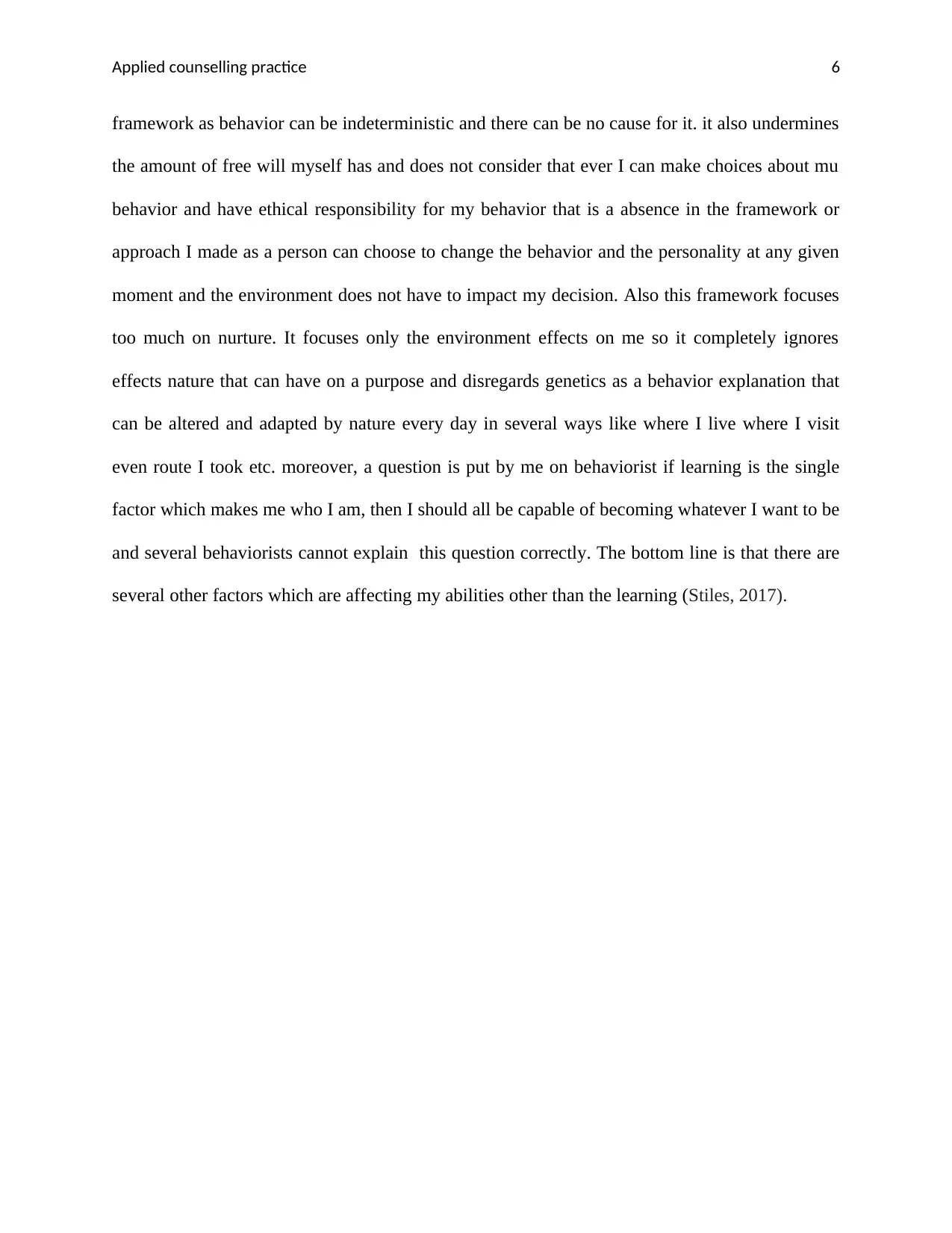
Applied counselling practice 6
framework as behavior can be indeterministic and there can be no cause for it. it also undermines
the amount of free will myself has and does not consider that ever I can make choices about mu
behavior and have ethical responsibility for my behavior that is a absence in the framework or
approach I made as a person can choose to change the behavior and the personality at any given
moment and the environment does not have to impact my decision. Also this framework focuses
too much on nurture. It focuses only the environment effects on me so it completely ignores
effects nature that can have on a purpose and disregards genetics as a behavior explanation that
can be altered and adapted by nature every day in several ways like where I live where I visit
even route I took etc. moreover, a question is put by me on behaviorist if learning is the single
factor which makes me who I am, then I should all be capable of becoming whatever I want to be
and several behaviorists cannot explain this question correctly. The bottom line is that there are
several other factors which are affecting my abilities other than the learning (Stiles, 2017).
framework as behavior can be indeterministic and there can be no cause for it. it also undermines
the amount of free will myself has and does not consider that ever I can make choices about mu
behavior and have ethical responsibility for my behavior that is a absence in the framework or
approach I made as a person can choose to change the behavior and the personality at any given
moment and the environment does not have to impact my decision. Also this framework focuses
too much on nurture. It focuses only the environment effects on me so it completely ignores
effects nature that can have on a purpose and disregards genetics as a behavior explanation that
can be altered and adapted by nature every day in several ways like where I live where I visit
even route I took etc. moreover, a question is put by me on behaviorist if learning is the single
factor which makes me who I am, then I should all be capable of becoming whatever I want to be
and several behaviorists cannot explain this question correctly. The bottom line is that there are
several other factors which are affecting my abilities other than the learning (Stiles, 2017).
Paraphrase This Document
Need a fresh take? Get an instant paraphrase of this document with our AI Paraphraser
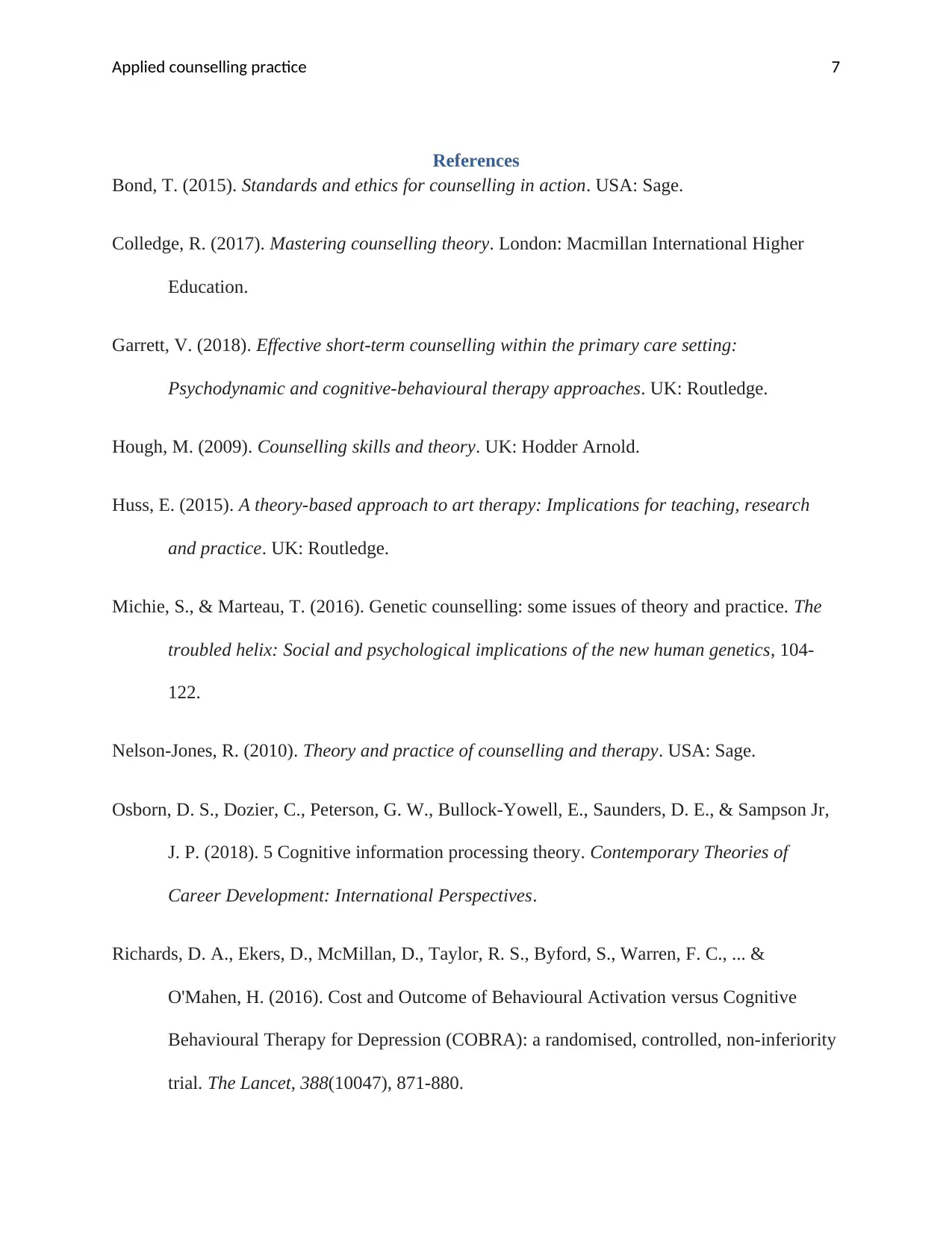
Applied counselling practice 7
References
Bond, T. (2015). Standards and ethics for counselling in action. USA: Sage.
Colledge, R. (2017). Mastering counselling theory. London: Macmillan International Higher
Education.
Garrett, V. (2018). Effective short-term counselling within the primary care setting:
Psychodynamic and cognitive-behavioural therapy approaches. UK: Routledge.
Hough, M. (2009). Counselling skills and theory. UK: Hodder Arnold.
Huss, E. (2015). A theory-based approach to art therapy: Implications for teaching, research
and practice. UK: Routledge.
Michie, S., & Marteau, T. (2016). Genetic counselling: some issues of theory and practice. The
troubled helix: Social and psychological implications of the new human genetics, 104-
122.
Nelson-Jones, R. (2010). Theory and practice of counselling and therapy. USA: Sage.
Osborn, D. S., Dozier, C., Peterson, G. W., Bullock-Yowell, E., Saunders, D. E., & Sampson Jr,
J. P. (2018). 5 Cognitive information processing theory. Contemporary Theories of
Career Development: International Perspectives.
Richards, D. A., Ekers, D., McMillan, D., Taylor, R. S., Byford, S., Warren, F. C., ... &
O'Mahen, H. (2016). Cost and Outcome of Behavioural Activation versus Cognitive
Behavioural Therapy for Depression (COBRA): a randomised, controlled, non-inferiority
trial. The Lancet, 388(10047), 871-880.
References
Bond, T. (2015). Standards and ethics for counselling in action. USA: Sage.
Colledge, R. (2017). Mastering counselling theory. London: Macmillan International Higher
Education.
Garrett, V. (2018). Effective short-term counselling within the primary care setting:
Psychodynamic and cognitive-behavioural therapy approaches. UK: Routledge.
Hough, M. (2009). Counselling skills and theory. UK: Hodder Arnold.
Huss, E. (2015). A theory-based approach to art therapy: Implications for teaching, research
and practice. UK: Routledge.
Michie, S., & Marteau, T. (2016). Genetic counselling: some issues of theory and practice. The
troubled helix: Social and psychological implications of the new human genetics, 104-
122.
Nelson-Jones, R. (2010). Theory and practice of counselling and therapy. USA: Sage.
Osborn, D. S., Dozier, C., Peterson, G. W., Bullock-Yowell, E., Saunders, D. E., & Sampson Jr,
J. P. (2018). 5 Cognitive information processing theory. Contemporary Theories of
Career Development: International Perspectives.
Richards, D. A., Ekers, D., McMillan, D., Taylor, R. S., Byford, S., Warren, F. C., ... &
O'Mahen, H. (2016). Cost and Outcome of Behavioural Activation versus Cognitive
Behavioural Therapy for Depression (COBRA): a randomised, controlled, non-inferiority
trial. The Lancet, 388(10047), 871-880.
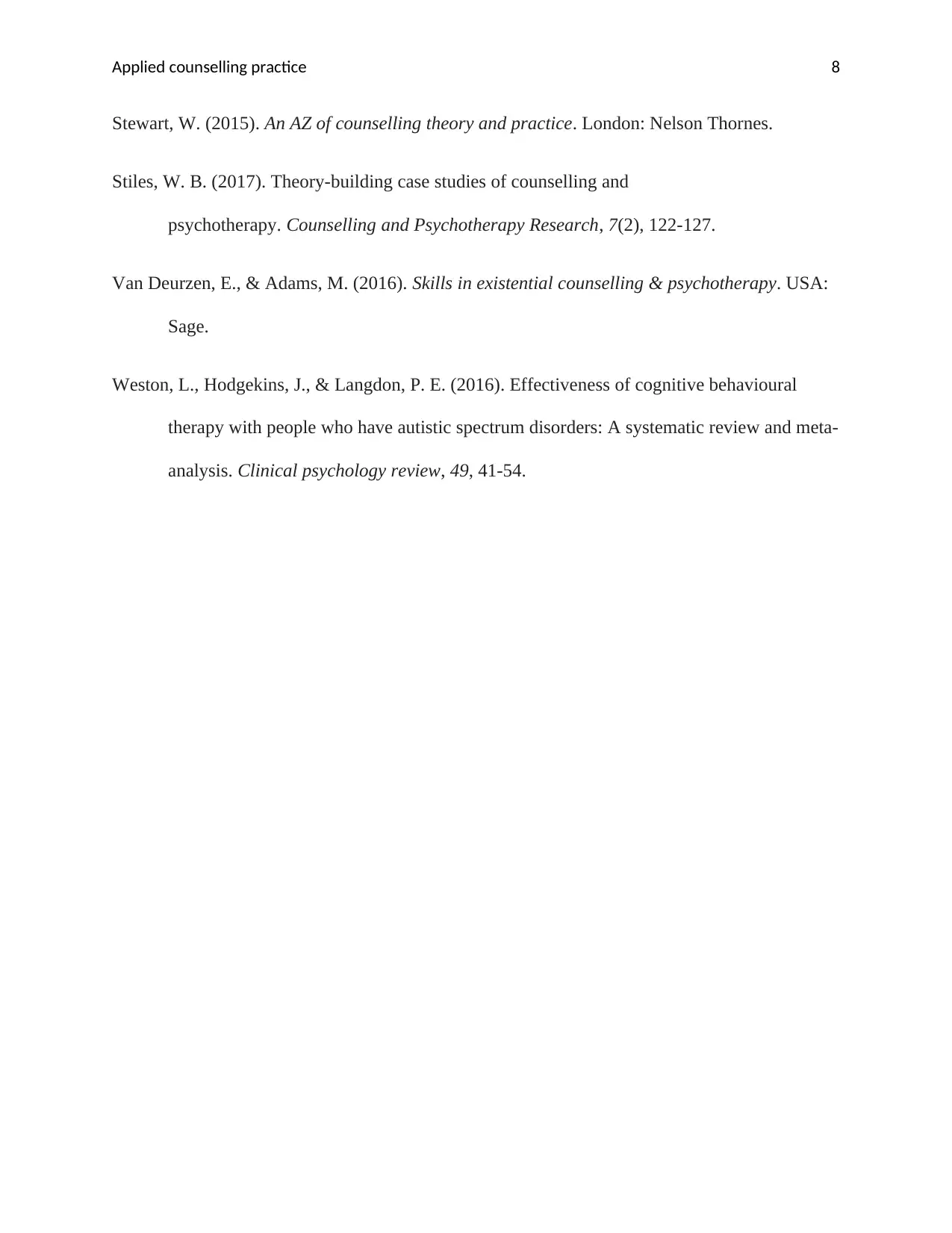
Applied counselling practice 8
Stewart, W. (2015). An AZ of counselling theory and practice. London: Nelson Thornes.
Stiles, W. B. (2017). Theory‐building case studies of counselling and
psychotherapy. Counselling and Psychotherapy Research, 7(2), 122-127.
Van Deurzen, E., & Adams, M. (2016). Skills in existential counselling & psychotherapy. USA:
Sage.
Weston, L., Hodgekins, J., & Langdon, P. E. (2016). Effectiveness of cognitive behavioural
therapy with people who have autistic spectrum disorders: A systematic review and meta-
analysis. Clinical psychology review, 49, 41-54.
Stewart, W. (2015). An AZ of counselling theory and practice. London: Nelson Thornes.
Stiles, W. B. (2017). Theory‐building case studies of counselling and
psychotherapy. Counselling and Psychotherapy Research, 7(2), 122-127.
Van Deurzen, E., & Adams, M. (2016). Skills in existential counselling & psychotherapy. USA:
Sage.
Weston, L., Hodgekins, J., & Langdon, P. E. (2016). Effectiveness of cognitive behavioural
therapy with people who have autistic spectrum disorders: A systematic review and meta-
analysis. Clinical psychology review, 49, 41-54.
⊘ This is a preview!⊘
Do you want full access?
Subscribe today to unlock all pages.

Trusted by 1+ million students worldwide
1 out of 9
Related Documents
Your All-in-One AI-Powered Toolkit for Academic Success.
+13062052269
info@desklib.com
Available 24*7 on WhatsApp / Email
![[object Object]](/_next/static/media/star-bottom.7253800d.svg)
Unlock your academic potential
Copyright © 2020–2025 A2Z Services. All Rights Reserved. Developed and managed by ZUCOL.





